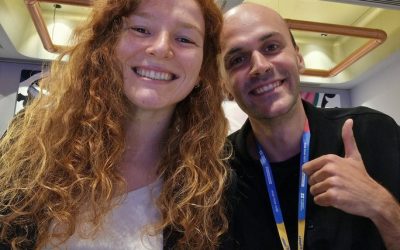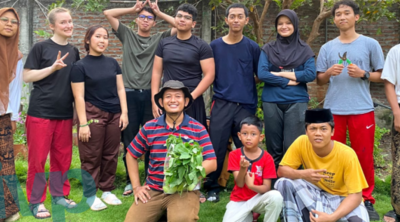Is there a strong man here?
Gender relations within volunteering
Pacifism, solidarity, friendliness, ecology, diversity and citizenship. These are the six values of SCI. This movement, now 100 years old, has witnessed many struggles and social changes and has also evolved over time.
SCI advocates inclusiveness, equality and acceptance for all. So I was surprised to read, in an account of a volunteer project from the 1960s, that “men dealt with the physical work while women did the housekeeping (SCI Belgium, 2020)! I was astonished by this two-way division of labour, given the battles that SCI is waging today against this type of stereotype. Of course, on reflection, I realised that it was ‘normal’ for SCI to have evolved with society. The Service Civil International put a great emphasis on evicting gendered stereotypes and these efforts are reflected – generally, as we shall see – in practice.
From theory to practice…
In 2022, I took part in a workcamp in Portugal to control invasive species. There were seventeen of us working in a nature reserve near Porto: as many girls as boys, all motivated. The work was quite physical, and everyone had prepared for it.
And yet, despite a favourable context, certain situations have turned out to be less egalitarian than we might have imagined. Asking whether boys can come and carry the tools because they are heavy may seem anecdotal, but these little remarks here and there add up to a paternalistic construction of society.
Mansplaining
The concept of mansplaining refers to a situation where a man explains to a woman what she already knows. Let’s go back to 2022 in Portugal: we’re working with three volunteers to clear a path. It’s quite physical because we’re moving kilos of mud. I’m working with two boys, and one of them asks me several times if I want to switch tasks, because what I am doing ‘is pretty tiring’. I understand that he’s only asking me ‘because I am a girl’ and, despite my feminist ego, I end up agreeing. My co-volunteer then began to explain to me what I had to do with the shovel (i.e. what we’d been doing for the last hour). It was, of course, an isolated act, a blunder. The problem, in my view, is the repetition of these small isolated acts, which together create a whole gendered context that implicitly reinforces stereotypes.
The danger of implicit
These small situations, apparently not important, are quite sneaky. And they are found in volunteering, as in all contexts of life, because they are internalised. They are easily minimised because they are considered individually and not in their overall context. It’s hard then to fight something you can’t see. We’ve all heard the famous ‘oh, it’s all right, it’s no big deal’, a variation of the no less well-known ‘don’t complain, it could be worse’. This phenomenon is linked by extension to the discourse of certain people – especially men – for whom feminism no longer has any reason to exist because women are now equal to men: the right to vote, financial autonomy, representation (in particular gender parity in certain organisations, thanks to the introduction of quotas). These changes are more quantitative, and therefore visible, whereas the equality of domestic tasks, mental burden, or the elimination of clichés (a woman is less strong than a man by default, as in my example) cannot be measured.
It’s not always easy to dare to assert oneself in such situations, and unfortunately, this is what contributes to the invisibility of these inequalities. In the collective imagination, women are gentle and willing to make concessions. This image influences our behaviour, consciously or unconsciously. However, this model is being turned upside down with the emergence of stronger, more assertive personalities than ever before. The aim is not to force ourselves and completely change our way of being, but to draw inspiration from the commitments of these inspiring people to change society, one small remark at a time.
In volunteering like elsewhere, let’s dare to deconstruct gendered roles and go beyond the limits patriarchy has imposed on us. And let’s always ask ourselves: what will future generations think when they read our stories?
Sarah Planche, volunteer at SCI Belgium
References:
SCI Belgium. (2020). Témoignages d’ici et d’ailleurs : 100 ans de volontariat. https://www.calameo.com/read/007557071c347a4d11c2a
Explore more news
Emma’s Testimony from the No More War Open Forum
“No More War” is more than a slogan – it’s a global network of activists taking action against the militarization of our world. Emma, a SCI volunteer, took part in the Open Forum in Bulgaria and shares her experience. At a time when militarism is on the rise – with escalating armed conflicts, record-high defense budgets, the normalization of genocides, and the return of conscription in several...
Tobias Drilling: SCI’s voice in the Council of Europe!
Tobias, a staff member at SCI Switzerland, was nominated by SCI to be a candidate to the Council of Europe’s Advisory Council on Youth and an advocate for youth rights & global justice. The Advisory Council on Youth, made of 30 representatives from youth NGOs and networks in Europe, brings the voices of young people to the Council of Europe (CoE). As a non-governmental partner to the CoE, it...
Supporting Community Urban & Peri Urban Permaculture Gardens in Semarang
Sendangguwo Permaculture Camp has been attended by 2 Indonesian Volunteers, 15 part-time Indonesian volunteers, and a volunteer from Germany named Anna. Ifa and Sany are camp leaders at the workcamp located in Semarang, Indonesia, from the 14th to the 27th of April 2025. Permaculture has become a hot topic for young people in Indonesia. Because there is not much literature available in...




